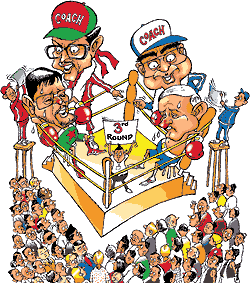 The Maoist politburo is meeting this week near Naxalbari in India to decide on the underground party's agenda for the third round of peace talks. In Kathmandu, the Nepali Congress (NC) government is doing the same in party huddles and with the parliamentary opposition.
The Maoist politburo is meeting this week near Naxalbari in India to decide on the underground party's agenda for the third round of peace talks. In Kathmandu, the Nepali Congress (NC) government is doing the same in party huddles and with the parliamentary opposition. Although there has been a lot of hardline rhetoric, neither side wants to discontinue the talks which is expected in the next few days. The next round has to go into the core issue of what the Maoists are finally willing to settle for after six years of war and 2,000 Nepalis killed. The top Maoist leadership is now hemmed in by domestic, regional and international factors:
. Public opinion against threats, intimidation and extortion
. This week US Secretary of State Colin Powell labelled all groups using violence against legitimate governments terrorists
. Then Indian foreign minister Jaswant Singh made an unprecedented denouncement of Nepal's Maoists
. The royal palace and army talk tough
The Maoist leadership also faces pressure from local commanders beginning to disobey them. Many local cadre are acting on their own, in some cases giving the revolution a dangerous communal tint. Senior leaders now need an exit strategy which will be acceptable to the government, and also satisfy those lower down the ladder. This is a critical compromise that will be the main challenge for Comrades Prachanda and Baburam Bhatarai.
The government can't put the Maoist leadership too much in a spot, otherwise a hardline faction will split off and head for the hills again. Prime Minister Sher Bahadur Deuba, after bringing the negotiations this far is now also facing open dissatisfaction from within his own party and the palace. Both think he has given in too much to Maoist demands.
King Gyanendra expressed displeasure last week in a conversation with NC leader Ram Chandra Poudel about politicians not standing up against the Maoists' anti-monarchy stance. Then, in an unprecedented move, the Defence Ministry warned Maoists last Friday against inciting the public against the monarchy. Senior ministers in the Deuba cabinet said they were "shocked" by the statement, which should normally have come from the Home Ministry. One minister told us: "The palace has now done a U-turn on the Maoists."
An all-party meeting in Baluwatar on Monday evening designed to prepare for the third round ended in disarray. There is increasing dissatisfaction with what is seen as the prime minister's secretive ways in dealing with the Maoists, and his perceived leniency towards them. Not everyone is convinced the Maoists are negotiating in good faith. One minister admitted: "The prospect of coming out into parliamentary politics does not explain the Maoists' readiness for talks. They are arming and regrouping, and we'd better be prepared."
ETHNIC EDGE
As the political struggle of the Maoist revolution recedes, the government is getting sinister indications from some areas of a new communal edge. After the truce went into effect, there have been incidents where local Maoists cadre have desecrated Hindu temples, slaughtered cows, and in the tarai triggered a dangerous polarisation with the madhesis. The bahun-dominated Maoist leadership now faces a stark choice: sell a political solution to its own followers, or resume the armed struggle. If the Maoists go for a political solution, disgruntled Maoist militia can easily be assimilated into the police or army.
Prospects of reaching a viable agreement through the present negotiation process looks dim, but neither the government nor the Maoists can afford to disavow talks. Even if the present talks fail and there is a return to fighting, both sides will soon have to return to meaningful negotiations. The present process has been stymied by dead-end demands from the Maoists for a republic and scrapping the constitution. Except for these two, most other issues on the Maoist agenda are negotiable and there is multi-partisan consensus on them.
If the Maoists come up with concrete and dramatic concessions during the third round, there is still a chance that the present process can be salvaged. Otherwise, it is back to war. And this time, it will be different: the army will be in the fray, both sides will use heavier automatic weapons.
The Maoists need a soft landing, a cushion which they don't at present have. It's up to the parliamentary parties to provide them that. Their's is a political cause, not an ethnic or separatist war. The way out is public debate and negotiation.


